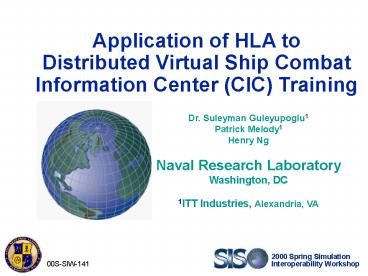Application of HLA to PowerPoint PPT Presentation
1 / 23
Title: Application of HLA to
1
Application of HLA to Distributed Virtual Ship
Combat Information Center (CIC) Training
Dr. Suleyman Guleyupoglu1 Patrick Melody1 Henry
Ng Naval Research Laboratory Washington,
DC 1ITT Industries, Alexandria, VA
2
Outline
- Objective
- Background
- Implementation
- Results
- Discussion
- Conclusions
3
Objective
- Investigate how well HLA RTI can support Navy
applications - Identify required capabilities which are not
provided or addressed by HLA RTI
4
Background
- AEGIS Training Readiness Center (ATRC) conducts
surface combatant crew training with real combat
consoles in a classroom environment - Issues
- High acquisition and maintenance cost for real
consoles - Limited number and low availability
- Long lag time for new advanced concept system
consoles
5
Background (2)
- NRL was tasked to couple simulation and Virtual
Reality (VR) to develop a Distributed Synthetic
CIC training system with - Lower cost for maintenance
- Higher availability
- Ability to train crew on future advanced systems
before hardware production
6
Virtual CIC
- Virtual CIC is a Virtual Reality system that
simulates a ship Combat Information Center - Each participants appears in the CIC as a crew
member - The system can be used for training and other
applications
7
Virtual CIC Multiple ships
HLA RTI
8
Requirements
- Tactical picture consistency
- Reliable communication
- Timeliness (0.5 sec)
- Some entities should be owned in order to
interact with them
9
Ownership
Original Console State
User 1 says I pressed A, she pressed J User
2 says I pressed D, he pressed M
10
Procedure
- Have N users run the application (N2..8)
- Have Users 1 to N push buttons, taking turns
- Measure response time
11
Computer Hardware
12
Network Configuration
13
Ownership Exchange Results
14
Average Response Time
Octane
Onyx
Indigo2
15
Discussions
- Pros
- RTI API hides implementation detail
- Acceptable performance for the application tested
- Cons
- Does not work well with IRIS PerformerTM
- Ownership exchange at attribute level only
- No feedback mechanism for declined ownership
requests
16
Ownership Request
Fed 1
Fed 3
Obj. A
Request ownership of x,y,z
x
RTI
y
z
Fed 2
17
Ownership Request
Fed 1
Obj. A
Fed 3
x
x
RTI
x,y,z
Fed 2
y, z
Obj. A
y
z
18
Ownership Mgmt - Pull (Intrusive)
19
HLA I/F Spec
The AttributeOwnershipReleaseResponse service
shall notify the RTI that the federate is willing
to release ownership of the specified instance
attributes for the specified object instance. The
federate shall use this service to provide an
answer to the question posed as a result of the
RTI invocation of RequestAttributeOwnershipRelease
. HLA
Interface Specification
20
Conclusions
- In general, RTI can support distributed virtual
CIC system operation - Ownership handoff
- Do not have major problems however,
- No feedback from RTI when ownership requests are
denied. - Time-out is not a good strategy when running on
WAN - May have problems for applications with long
interaction duration (e.g. distributed virtual
prototyping)
21
Conclusions (2)
- RTI ambassador code conflicts with IRIS
PerformerTM. - This creates some flaky behavior, including
problems with stereo display activation. The
problem disappears when not linking with the RTI
library. - Hard to identify the problem since the RTI
Ambassador source code is not available to debug.
Talked to RTI developers no resolution.
22
Suggestions
- RTI should provide mechanism to deny ownership
requests so that requesting federate gets
(prompt) feedback. - RTI Ambassador source code (at least the part
that gets linked with user code) should be
available to facilitate debugging.
23
Acknowledgements
- The authors thank the Navy Modeling and
Simulation Office (OPNAV N6M) for sponsoring this
study. - In particular, we thank Mr. James Weatherly and
Mr. George Phillips of N6M and Dr. Susan Numrich
of NRL for their valuable input and review of the
work. - In addition, JADS staff has been helpful with
their input early in the project.

